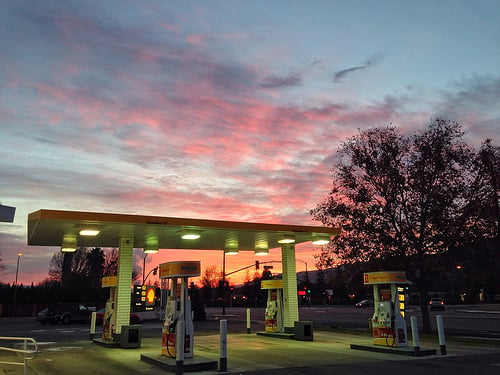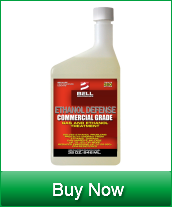How to Fix Bad Gas in a Car
When you’re asking the question ‘how do I fix bad gas in my car’, you’re talking about a different kind of situation than fixing bad stored fuel...

All petroleum fuels have a limited storage life. Over time, their quality will degrade and change ("break down") primarily because of chemical reactions that happen in the fuel. These reactions are inevitable and can happen faster if the fuel is exposed, over time, to things like air, water, and catalytic metals. All the stuff that happens in the real world.
These aren't the kind of things you can see in real-time, but you see the results over time – gas that has darkened and stratified, and probably undergone phase separation (separation of the alcohol from the gas in ethanol fuels). Diesel fuel has the same problems except for the phase separation bit.
When it comes to dealing with “old gas”, that’s largely a consumer problem. Very few businesses store gasoline for sizable periods. If it’s stored business fuel for any substantial length of time, it’s most likely going to be diesel fuel.
So that leaves consumers who face the issue. They often buy smaller volumes of gas, put it in containers for some present-day or near-future use, and then forget about it. They find it sometime later, and it’s now “old gas”.
The question is, is there anything that can be done to restore the old gas to a usable condition? The answer depends on how far gone it is.
How do you know? The first thing you would look for, if it is ethanol gasoline (which most gasoline is) is whether it has phase-separated. If you didn’t treat the gas before you put it in storage, after more than a few months, it most likely is undergoing phase separation. You’ll have two layers in the tank – a layer of water plus alcohol on the bottom, and a layer of gasoline on top.
If the gas has phase-separated, then it’s highly unlikely you’ll be able to do anything worthwhile with it. There are some professional-grade treatments that, when used in the right way, can help put phase-separated back together. But they're designed to be used by professionals with the know-how and equipment to use them correctly. Those aren't likely to be the options you'll be faced with.
There are bogus fuel additives out there that claim to “restore” phase-separated gasoline. But what they mean is that they “might” help gas that has barely started the process. This isn't what most people think of when they decide to try something like that. They're hoping it will magically repair fully-separated gasoline - make it just like it was before. For gasoline that is as old as you’re likely to find, there’s nothing cost-effective that will restore it to its previous homogenous condition.
For gasoline that has not phase-separated, but which may appear darkened, this means that it has reacted internally to the point where some of its heavier-end components have polymerized and are forming gums and varnishes. If you were to burn this in an engine, it may well run, but these heavier components won’t fully combust. They will leave deposits in combustion areas of the engine, like injectors and carburetors.
These kinds of deposits can really do a number on the efficiency of the engine. In most cases, it wouldn’t be recommended to burn that fuel. Unless you add a fuel additive that contains a high level of detergency. Such an additive would function to help remove these deposits as they were being formed, giving your engine its best chance of staying problem-free.
So for old gas, if you’re in a position where you really have to use it, remember to use a high-detergent fuel additive. The reputable types of these additives will specifically tell you that they contain injectors or other kinds of detergents. In other words, they won’t rely on some generalized claim about “cleaning” that they typically ascribe to being a secondary benefit of some weird-sounding “new technology”. Like you might have some no-name fuel additive that claims it “uses nanotechnology to clean the engine” – c’mon man, seriously?
There are plenty of excellent and effective detergent packages out there. There are PIB detergents (polyisobutylene) as well as PEA polyether amine detergents that are formulated to be compatible with gasoline that contains more than 20% ethanol. Using a fuel additive that contains a higher level of one of those detergent chemistries will give you your best chance of being able to successfully use old gas. Provided it hasn’t undergone phase separation, of course.

When you’re asking the question ‘how do I fix bad gas in my car’, you’re talking about a different kind of situation than fixing bad stored fuel...

So why does gas go bad? It all has to do with gasoline's chemical composition.

Gas prices may be going down but it's always a great idea to be thinking about saving money on the road by doing some little things to get better...